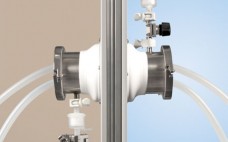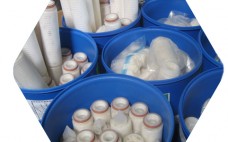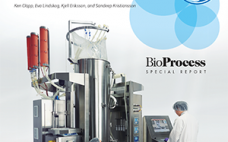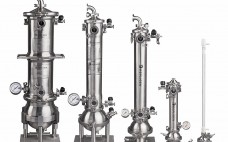This webcast features: Beth DiPaolo, M.A., SPHR, President, Eurofins Lancaster Laboratories Professional Scientific ServicesSM Many pharmaceutical and biopharmaceutical companies are currently experiencing strong development pipelines, but they face challenges associated with balancing the expanded workloads with restrictions on employee headcounts. To combat this, companies often turn to temporary staffing; however, due to the challenges in finding, training, and retaining motivated talent, the temporary staffing model does not meet current demands in these areas. As an expert with 14 years of…
Sponsored Content
Applying Single-Use Efficiencies to Room-to-Room Fluid Transfer
Biopharma manufacturers need to transfer critical fluids from cleanroom to cleanroom quickly, aseptically, and with minimal effort and expense for maximum productivity. Traditional hard piping involves intensive cleaning operations and down time between uses. Portable tanks run the risk of damage and leaks and also present cleaning challenges. Incorporating Single-Use components and practices with in-wall transfer systems can help speed and streamline operations while maintaining isolated environments. These types of systems help remove the risk of breakage, spillage and lost…
Robust, Load Independent Viral Clearance in Monoclonal Antibody Purification
Anion exchange chromatography is an important flow-through polishing step for viral clearance of monoclonal antibodies. Resin based materials are most commonly used for this but the large size of virus particles limits diffusion and binding capacity. It is therefore necessary to use large volumes of resin and oversized column hardware. Column chromatography as a unit operation also means high operational costs, including validation, cleaning and storage. This is a particular issue for clinical manufacturing, where a column is used for…
Ask the Expert: FOLDTEC Refolding of Biopharmaceuticals A Case Study of Recombinant Thrombin
with Dr. Andreas Anton and Dr. Sebastian Schuck Poorly soluble substances form aggregated inclusion bodies (IBs) in microbial cells containing incorrectly and/or incompletely folded target proteins. Wacker Biotech, a full-service contract manufacturer of biopharmaceuticals based on microbial systems, has introduced FOLDTEC refolding technology for bioengineered therapeutic proteins. The proprietary platform uses specifically developed and optimized bacterial strains and a patented, antibiotic-free expression system. In a BPI webinar on 9 November 2015, Wacker’s director of bioprocess development (Andreas Anton) and head…
Special Report: Toward Sustainable Engineering Practices in Biologics Manufacturing
Introduction by William P. Flanagan Biopharmaceutical development and manufacturing demand scalable processes that can be quickly developed, easily implemented, and smoothly transferred to production. Disposable, ready-to-use technologies play a crucial role in providing flexibility to support agile biomanufacturing operations. Single-use systems provide process efficiencies by removing steps such as cleaning and cleaning validation, thus allowing for faster change-over between manufacturing runs. The biopharmaceutical industry is increasingly adopting single-use approaches, and the global market for such bioprocessing tools is expected to…
Single-Use Biopharma Product Recycling: An Alternative Process to Unlock the Challenges
This webcast features: Jacqueline Hollands Ignacio, Corporate Responsibility Programs Manager – Customer Initiatives, MilliporeSigma, and Michael Farrell is Corporate Disposal Coordinator, Triumvirate Environmental. As the biopharmaceutical industry increases the adoption of single-use manufacturing products, the issue of recycling becomes a challenge. Disposal and recycling the plastics from these products is a challenging task due to many factors such as limitations within the recycling infrastructure, products containing a mix of materials and plastics, and biopharmaceutical products can contain biologically hazardous materials…
Development and Optimization of CHOgro® Transient Expression Technologies for High Titer Antibody Production in Suspension CHO Cells
During early stage drug development, quickly obtaining relevant candidate proteins through transient transfection can accelerate drug discovery. High titers are often obtained from Human Embryonic Kidney (HEK) 293 derived cell types; however, the use of different host cells between early stage transient and later stable protein production is a concern and can lead to the advancement of false-positive candidates. Chinese hamster ovary (CHO) cells are a desirable target cell type due to growth characteristics and a history of regulatory approval;…
Process economy and production capacity: Comparing single-use and stainless steel strategies for microbial fermentation
In recent years, single-use technology has been migrating into many unit operations. With the commercial availability of such systems end users have a new option for process development and production that does not rely on operational complexities and utility requirements of conventional sterilize-in-place (SIP) or autoclavable systems. However, just as for cell culture processes, single-use technology may not apply to each and every fermentation or microbial process. It is the responsibility of practitioners to properly assess their own applications, select…
High Performance Cell Retention Technology for Cell Culture Process Intensification
This webcast features: Millie Ullah, PhD, Associate Director of Upstream Product Management and Marketing, Repligen The move toward continuous processing and intensified processes is a paradigm shift in bioproduction. In upstream cell culture, the challenge is to simplify and minimize process steps (N-1 perfusion) while intensifying cell retention and viability (high density cell expansion). This webcast will present a case study where use of the ATF cell retention system in process intensification of a fed-batch culture resulted in successful N-1…
An Extractable and Leachable Program for Assessing Single-Use Components and Systems
This webcast features: Chris Shields, Director of Global Product Validation Services at Saint-Gobain Life Sciences. Extractable testing is traditionally performed by single-use suppliers, and while not required by industry regulations, it is the drug manufacturer’s expectation that this information form part of a product’s data package. Extractable and leachable testing is designed to determine the chemical compounds that may migrate into the customer’s fluid from the single-use product’s fluid contact layer. Extractable testing utilizes aggressive but relevant test conditions, while…









